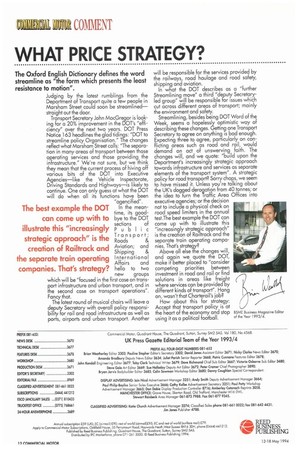WHAT PRICE STRATEGY?
Page 16

If you've noticed an error in this article please click here to report it so we can fix it.
The Oxford English Dictionary defines the word streamline as "the form which presents the least resistance to motion".
Judging by the latest rumblings from the Department of Transport quite a few people in Marsham Street could soon be streamlined— straight out the door.
Transport Secretary John MacGregor is looking for a 20% improvement in the DOT's "efficiency" over the next two years. DOT Press Notice 163 headlines the glad tidings: "DOT to streamline policy Organisation." The changes reflect what Marsham Street calls: "The separation in many areas of transport between those operating services and those providing the infrastructure." We're not sure, but we think they mean that the current process of hiving off various bits of the DOT into Executive Agencies—like the Vehicle Inspectorate, Driving Standards and Highways—is likely to continue. One can only guess at what the DOT will do when all its -functions have been "agencified". In the mean
time, its goodbye to the DOT sections of Public Transport; Roads Aviation; and Shipping & International Affairs and hello to two new groups which will be "focused in the first case on transport infrastructure and urban transport, and in the second case on transport operations". Fancy that. The latest round of musical chairs will leave a deputy Secretary with overall policy responsibility for rail and road infrastructure as well as ports, airports and urban transport. Another will be responsible for the services provided by the railways, road haulage and road safety, shipping and aviation. In what the DOT describes as a "further Streamlining move" a third "deputy Secretaryled group" will be responsible for issues which cut across different areas of transport; mainly the environment and safety. Streamlining, besides being DOT Word of the Week, seems a hopelessly optimistic way of describing these changes. Getting one Transport Secretary to agree on anything is bad enough. Expecting three to agree, particularly on conflicting areas such as road and rail, would demand an act of unswerving faith. The changes will, and we quote: "build upon the Department's increasingly strategic approach towards infrastructure and services as separate elements of the transport system". A strategic policy for road transport? Sorry chaps, we seem to have missed it. Unless you're talking about the UK's dogged derogation from 40 tonnes; or the idea to turn the Traffic Area Offices into executive agencies; or the decision not to include a physical check on road speed limiters in the annual test.The best example the DOT can come up with to illustrate this "increasingly strategic approach" is the creation of Railtrack and the separate train operating companies. That's strategy? Above all else the changes will, and again we quote the DOT, make it better placed to "consider competing priorities between investment in road and rail or find solutions in areas like freight where services can be provided by different kinds of transport". Hang on, wasn't that Charterail's job? How about this for strategy: Accept that transport policy is at the heart of the economy and stop using it as a political football.














































































































